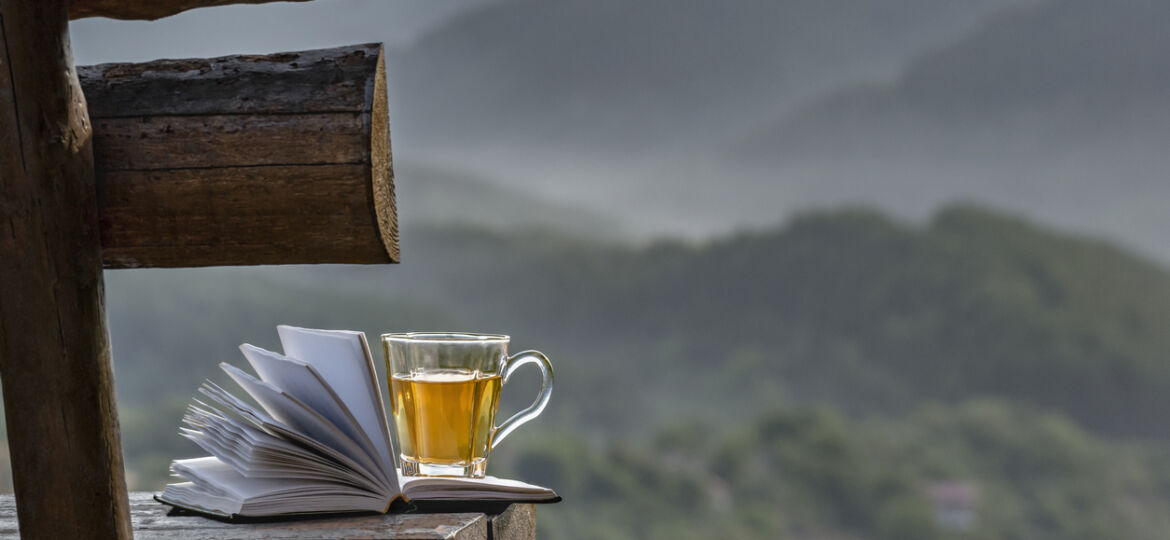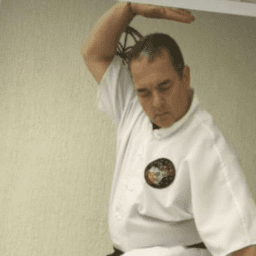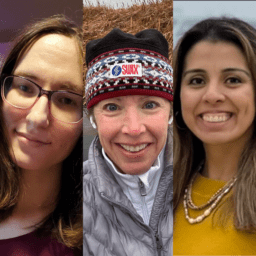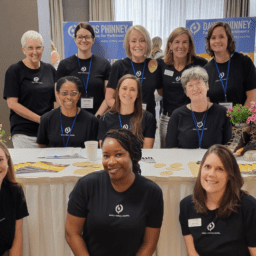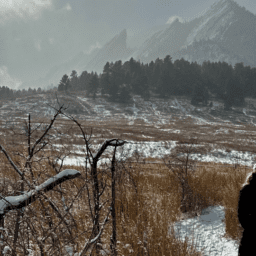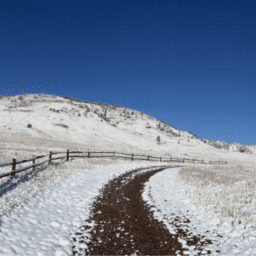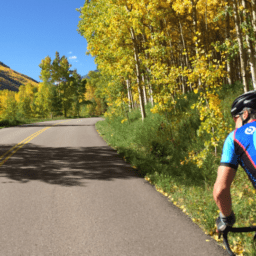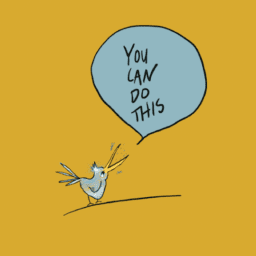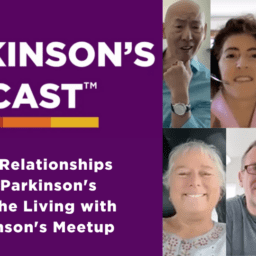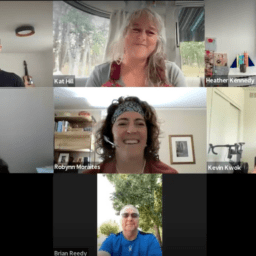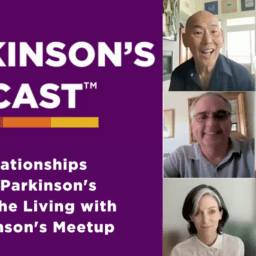Two years ago, a group of Davis Phinney Foundation Ambassadors came together for a Poetry as Medicine workshop with Wayne Gilbert. That one-hour session turned into a monthly poetry jam that has resulted in far more than words on a page.
At our second annual Poetry as Medicine Cafe, these poets shared the work they've developed over the past few years. We hope you'll be inspired by what they’ve learned, what they’ve written, and how poetry has become medicine to help them live well with Parkinson’s.
You can read the transcript below or download it here.
Wayne Gilbert (Poet/Teacher for Metaphor Medicine):
Hello everyone. My name is Wayne Gilbert. I am a poet and the facilitator/leader of this wonderful group of poets, mostly ambassadors from the Davis Phinney Foundation and probably a couple of other faces you might recognize from the Davis Phinney Foundation, as well. We've been meeting together for two full years now with only a few changes in the members of the group, very few. There are couple of people who couldn't be here tonight. Oh, there's Tom, good, Tom made it. The plan for this evening is for, that we'll, we're going to do two rounds. Each poet will read one or two poems in each round. We'll have a little tiny turnaround in the middle. But let me tell you a little bit about why poetry, especially regarding Parkinson's. A lot of people sometimes ask me, “what does poetry have to do with Parkinson's?” And for me personally, and I think for increasingly a few others, it has everything to do with it. I call it metaphor and medicine. However, be forewarned, poetry is not for everyone. The cowardly, devious deniers and liars cannot benefit from it. Poetry only works for those brave, compassionate, and impertinent enough to acknowledge name and accept the hardest truths, especially about themselves.
I have another very short poem, called “<parkie poet>”.
If a voice drops breaks falls silent
And no one is there to hear,
Did the voice ever make a sound?
To whom does its absence belong?
Davis Phinney (Founder, Davis Phinney Foundation):
I love that.
Wayne Gilbert:
So, poetry is, in part, about voice, about having your own voice and using your own voice. That's kind of where a lot of the medicine comes from. In Parkinson's, as you all probably know, are all too aware of, one of the things that often goes or diminishes is literally the human voice. But in poetry, there is no mute. There is no diminishment. There is no loss of voice. It's the opportunity to express what is deepest within you and share with others. So, let's get right down to it. Our rule, when we meet, is always, to put it crudely, shut up and read. By that, we mean there are no big, long explanations. There's no introduction to the poems. We read the poems, we look up and then we applaud. This is the way we applaud because zoom doesn't like all this noise. This is applause in American Sign Language. Our first poet this evening is from Ontario, our Canadian and good friend who is very active in the Canadian Parkinson's community, as well as our own, Joe van Koeverden, Joe.
Joe van Koeverden (Ambassador, Davis Phinney Foundation and Parkinson Canada):
Yeah. I'm going to start with “Make a Mark with Your Spark”.
Living in a material domain
We judge each day, by what we do.
Marking the passing of time too.
Thoughts of who we are, our refrain
Are we spirit or are we beast?
Will we war or together feast?
Can we share our earth today?
Can we hold our enemies at bay?
In our bodies we feel autonomous.
But when we breath, we breath the same air.
Its only in space we need to possess,
on earth the O2 we need to share.
Are we alone, do others exist?
Have they watched us, or even more?
Do they see how the “gods” we adore?
Will they come in peace, or on war insist?
As we pass from the material sphere,
We let go of everything, matter is gone.
No need for time as everything is one.
Past, present and future all seem so near.
Will questions be answered, even our mold?
As was that what we were told?
What will it be like, being altogether?
As spirits merging for the better?
Don’t hold life too dear my friend,
As your future may be around the next bend.
But don’t waste your spark, leave a mark
Then we can say we lived not in the dark.
So, I go right on the next one?
Wayne Gilbert:
Yes, Joe, please. Go right ahead.
Joe van Koeverden:
Okay. “Pay it Forward.”
It all seemed normal,
Slowing down with age.
Gravity pulling at my body
to make the ground a closer friend
ready to meet in a moment’s notice!
But I push back again.
Refuse to meet at his level
Walking straight, poles in hands
Taking the trail till the cedars end
working through the stiffness and the pain.
I will push back
today, as I can for now
Not knowing what tomorrow
will hold, or how I will respond.
I do my best, forget the rest till morn
And as the morn revives
Rise to meet my daily challenges
To make do with what there is today
Being helpful and supportive in any way.
It may not be my best, but it is all I have left.
Pay it forward
In selfless acts of kindness.
For you too may find that one day
You can no longer walk alone on your trail
Needing the same support, you freely gave away.
Thank you.
Wayne Gilbert:
Joe. Thank you so much. Wonderful, wonderful. Joe has quite a website. You should free feel free to check out sometime. He has some poems there among other things. You can see his name, I think, below, his name and find his website that way. Thanks Joe.
Joe van Koeverden:
Thanks Wayne.
Wayne Gilbert:
I'm going to introduce the next person. Some of you might already know him. And he joined our group about a year ago now, I think, and has been bringing poems every month. Davis Phinney.
Davis Phinney:
Thank you, Wayne. This is called “The Weight of Yourself” and it was written in June 2021 and it's my first entry as a poet.
A dream remembered in fragments, an old film run through a family projector, scratchy, uncertain, but it is me, sliding on snow, going with gravity for once. Flowing, floating and in control of my body. I am in control of my body, a rare and beautiful sensation, a luxury anymore. The province solely of dreams, dopamine deficiency, stripping away my abilities, like a tree removed of bark leaving me vulnerable, weak, exposed. And yet in this dream, I luxuriate in the waiting and unweighting the absolute joy of attaining a certain lightness of being, if only for an elusive few moments. But in those moments, I am free like a hawk flinging itself up, up onto a soaring thermal, untethered, unrestricted filled with purpose and grace, unbound. The film runs its course, preview over, real looping round and round as the grainy picture grows big, still savoring the sensation, eyes open and testing to feel the weight of myself. Not too heavy. Yeah.
Wayne Gilbert:
Yeah, yeah. I hope members of our audience are noticing already that one of the ways poetry really makes a difference in our lives, especially our inner lives, I think, is this way of facing some difficulty, some honest appraisal of what's happening to me. And as we reach down and grab that, something comes with it in the poem, usually by the end or somewhere near the end, that gives something back, something for us to take away from that acknowledgement, which might be painful. Well, our next poet isn't here yet. I hope. Oh, there she is.
Jan Grimes (Ambassador, Davis Phinney Foundation):
Y’all, we have had some-
Wayne Gilbert:
Okay. That's alright. Jan, take your time. We'll go on ahead. Okay?
Jan Grimes:
Please. Yes. Thank you. I’ll be right there.
Wayne Gilbert:
Here. Okay. So, I'm going to invite Connie to read if she would. Connie Carpenter Phinney. Connie's been for, with the group from the very beginning. And yeah, go ahead, Connie.
Connie Carpenter Phinney (Co-Founder, Davis Phinney Foundation):
I am the token caregiver in the group and an avid poet, I would say my whole life, so this has been a wonderful experience for me. Thank you all of you guys for letting me fill that role for you. This is called “Nothing Left” and I think it was a prompt based on forgiveness.
Nothing Left
Nothing Left. In the luminous west, time flies, pulling contrails into the night, like dreams into liminal spaces, gravity anchors, feet to cold earth, bodily remains, Sol in the sky, dwindling, light lasting eternal. Awe, nothing to forgive, nothing left to forget.
Wayne Gilbert:
Thank you, Connie.
Connie Carpenter Phinney:
Thank you.
Wayne Gilbert:
You could see also poetry is not, does not require one length or another. Some poems are very short. Some poems are longer. Some poems are really long. It all depends on what it is you’re trying to say and to whom. Well, let's hear from our next poet. Tom Constantino joined us just a few months ago and we're really happy to have Tom with us and Tom's going to read, which one are you going to read first, Tom?
Tom Cosentino (Ambassador, Davis Phinney Foundation):
I'd like to read “Stranger,” if I may.
Wayne Gilbert:
Great.
Tom Cosentino:
Okay. Let me pull that up.
A stranger is. a friend you have not made yet.
6 1/2 years ago Parkinson’s was a stranger to me.
He Introduced himself rather subtly at first
it was just a slight tremor in my left arm.
As the days turn into weeks and weeks turned into years
he came less of a stranger.
He became my friend. As such with any friendship
I welcome him with open arms.
Today I take him with me wherever I go.
I find in life it is easy to travel with a friend than a stranger.
Wayne Gilbert:
Have you got another one right now?
Tom Cosentino:
Yeah, its “Basic Training”. That was one of the last ones I wrote. I kind of like it. So “Basic Training.”
Here We Go Again
Same old stuff again
Marching down the avenue …
Stand in this line
get a haircut
stand in this line
get a pair of boots
stand in this line
get your fatigues
forget who you were
forget where you came from
We are Alpha
Mighty Mighty Alpha
We are not many
we are one.
weekend pass
Sunday morning
sun is slowly rising
watching the dew
turn on radio
hear Casey Kasem’s voice
The Commodores playing
Easy, easy like Sunday morning.
I smiled to myself
at this moment I am not Alpha
I am just me.
Wayne Gilbert:
I'm just me. Poetry is music. Poetry comes with music. Poetry comes like music. It's a wonderfully musical medium. And it finds the music in language and in our emotions and even
in ideas for that matter. And I think you could hear some in Tom's piece there. Amy, you ready down there? Amy Carlson's in.
Amy Carlson (Ambassador, Davis Phinney Foundation):
Hi!
Wayne Gilbert:
Amy Carlson's in California. She has just put the top up on her convertible Volkswagen where she is, Volkswagen bug. And I think she's sitting at this beautiful place above LA. And she's going to read to us from there, Amy?
Amy Carlson:
I do, I have a beautiful view, but I had to put the top up because my phone was overheating. So yeah. All right. So here we go. This poem is called, “Isn't it perfect?” No, it's not called that. It's called, “It isn't perfect.” Okay.
A hole, a joke, a crossroads
The door doesn’t fit the frame
The path wobbles
The air is wicked
The light is so bright
my hands are so cold and the ice is hot
Her breath pops
One corner sinks, one door is missing, there are leaves in the bed
And l am left out in the rain
The xes are orange
The trees will go
The water is steel
We keep the keys on the seat
There is a pile of bark and I should leave
How do you reach the end?
Wayne Gilbert:
Whoa. Wow. How indeed. Nice, nice question at the end. Thank you, Amy. Do you have another one for this round or one, going to save it for the next?
Amy Carlson:
I should say it for the next because I've got one for each round, so.
Wayne Gilbert:
Perfect. Thank you. Jan, are you ready to go?
Jan Grimes:
Well, we have had some interesting things happen and it's all my fault. I fear. And this first selection may not be at the level, technically it needs to be, I mean, sound wise, but we're going to try give it a try and I will hopefully be better when my second time comes around.
Wayne Gilbert:
Is this the desert sky poem?
Jan Grimes:
It is indeed.
Wayne Gilbert:
Okay. So, there we go. Now, everyone, this is the, may I say a quick word, Jan, before you start?
Jan Grimes:
Please, these are your poems.
Wayne Gilbert:
I wrote this poem and submitted it to the group. And as I recall, Jan was one of the first people to say, “what is that?” Or something to that effect. She said, “I don't even know how to read that.” And I said, yeah, “that's the idea,” or something equally wise and insightful. And we began to talk about it and kind of play with it. And she took it as a challenge. And so, we spent some time on the side working with it and she created a piece where she basically reads my poem the way she reads my poem with music that she matched to the poem. So, Jan, take it away.
Jan Grimes:
Oh, I'm just going to tell you that this first part of the poem, Desert Sky the music was composed by my husband with my help and input. And the second half is actually a nocturne by the composer Francis Poulenc. And it's called Bal fantome, which means ghost ball. I think it's the music fits the rest of Wayne's poem really beautifully. Okay. Can you hear me so far?
Wayne Gilbert:
So far? You're good.
Jan Grimes:
Okay. Here we go. This is “Desert Sky”.
my body cannot i am
will-less
rise
my
only this
heavy
stone-head
on the hard-dark
base-
line
ache
re-
ceding
ex- nihilo a
light
plays
a little night-
blues off
the graphite
spills
whitegreys
splat-ter-dabs
my body
releases/my
tension un-
tombs
long ing
reach es
lean/s
toward
relief
Did any of that come through?
Wayne Gilbert:
Yes, it did. Yes, it did not as clearly as, as when we rehearsed or when you rehearse, but it, you know, I, sometimes I think, I think technology is a lot like Parkinson’s, some days things are working pretty well, never a hundred percent perfect by any means. And some days they're working, eh, kind of well, and some days they just downright, well, don't work at all. So, this was not the, the latter. It just, it wasn't, it wasn't as clear as it might have been Jan, but it was still lovely. And we-
Jan Grimes:
Could you hear the words?
Wayne Gilbert:
I'm glad we put the poem up.
Jan Grimes:
Oh, good.
Wayne Gilbert:
Yes. Thank you so much.
Jan Grimes:
You're welcome.
Wayne Gilbert:
This technology, I've had occasion to reflect on it a lot. As a recluse, especially a sort of hermit monk in my little cave above the city of Denver and zoom. This is a way to keep in touch, to keep engaged. It's not the same as if we were sitting beside the piano, listening to Jan play, and listening to her be on the mic. It's not the same as if we were literally sitting in the same venue together where we could hug or at least fist bump or whatever. But on the other hand, this group is amazing. I didn't mention, Jan is in Louisiana where she was on the faculty of LSU. And Tom is in Maryland and-
Jan Grimes:
We are a diverse group if nothing else, right?
Wayne Gilbert:
We are from all around the country and yes, I love that fact. We would not be together but for that, and that's right. In two years, we have become truly a community and, and the best deepest sense of that word we have. And that's a miracle. So, I celebrate that. So, next poet Joe O. Joe O'Connor lives in Massachusetts, but he happens to be in Maine where apparently the internet connections are, shall we say, problematic? So, he's with us on his phone and he's going to read on his phone, and you could look at his mug there while he reads. Joe?
Joe O'Connor (Ambassador, Davis Phinney Foundation):
Parkinson's is like an elevator ride. Well, the bumps and jumps and floors and landings.
Picture an elevator
since there arent any floor numbers in any area
you dont know what floor you got on at
the bottom of the section of floor is called
early onset
the middle? area of floors is called
normal time
but what about this elevator is "normal"
glancing at the top getting on area
you see the words "late onset"
I got on at "normal time"
I ask the operator on what floor I am getting off
some of those floors look pretty far away
no response is returned - seems ominous
the elevator jerks upward
take note this is no easy ride - there will be a lot of bumps
the doors open "at pity party"
there seems to be a lot of crying around a Christmas tree
then i realize this is my diagnosis date - right around Christmas
like a modern Scrooge - i wish to see no more
the silent operator yanks me back in
the elevator jerks upward again
the doors open at first fall
i find myself running with your running buddy when suddenly
my legs tangle and down i go
after a few stiches the operator pulls me back in
many stops go by
second fall
third fall
early retirement
support group
and so many clinical trial stops 47 as of right now
up the elevator continues its journey
the doors open at "DPF Ambassador"
this is such a fun place
some of the sub floors you see are:
Leadership conference
Poetry group
pen pals
storming the capital
and sooo many new friends names to count them all would be impossible
but all of us reach out to each other and share with each other
it is a warm feeling place
I love to linger there
the next floor visited is called praise
here we find that people really find value in what I do
strangely I find myself reluctant to step out
but with a rare smile the operator pushes me out
and I hear so many thanks and accolades
that my ears really echo with compliments
still in the elevator the operator smiles as he looks on
and then he beckons me to return
upward the elevator rises
the next floor is named chorus
on this floor
you are invited join even if "you cant carry a tune in a bag"
a fun floor
one I hope to continue to visit
I notice several sub -floors arranged by visit dates
good - it looks like many visits
but once the operator beckons for you to leave
Wayne Gilbert:
Thank you, Joe. Thank you. See, that's the other thing that's amazing about this place, that we're this screen we're on, is you can be here without actually being here. Yeah, strange here we are. Well, our next poet is in Washington state. Wendy Miller, Wendy, take it away.
Wendy Miller (Ambassador, Davis Phinney Foundation):
Thank you. This is called “Blurt, Memory”.
“Pick a memory, any memory.”
“But I don't have a good memory.”
I didn't say it had to be a GOOD memory.”
“No, that's not what I mean.”
“I know what you mean.”
“Just remember something at random…”
Okay, tiger swallowtail
Again
Lobster Cantonese
Another
My mother conquering her agoraphobia to try to pick me up from elementary school in her bathrobe.
See what I mean?
As I recounted the prompt to him, he made a Nabokov joke: “Speak, Memory.”
Then “Squeal, Memory.”
Then “Blurt, Memory.”
See what I mean?
You have no idea what you mean…
The memory of visiting the birthplace of Hieronymus Bosch showed up
As a dream
But when I woke
I wasn't convinced it was a REAL memory
Because what in the world were a music festival and a bunch of Bohos on an intercity train
Doing in the artist's memory?
But he confirmed it.
Blurt, Memory.
Wayne Gilbert:
Thank you, Wendy. Thank you. I hope you can also begin to see, dear audience, listeners, viewers, that the range of subject matter here is wide. And I do send a prompt out each and every month, but that doesn't mean that everyone uses it because often a poet has a prompt of his or her own and goes with that, which is as it should be. Everyone's a poet by nature. I know there are many of you thinking right now that can't be certainly not me. Yes. it's as much a part of you as the child in you and whatever your capacity to play might be as an adult is equal to the capacity to be a poet because those two are strongly linked, play and poetry. Most of the people in this group didn't write poetry before they came, we came together and every single poet here I can tell you is writing work now that they would not have dared think they were capable in many cases two years ago. It's true.
And it's awesome to see. I don't believe for a minute that everyone, that not everyone could be a poet. Everyone is already, it isn't about becoming one. You just have to kind of find that voice within you. I'll share a little piece here. It's a kind of it, it's a Parkie blues. I'm, it's called “Some mornings.”
some mornings i wake up
some morning i never do
some days i get in gear
some days i never do
some days i feel like dancing
some days i can’t remember how
today i waited and waited
lingering deep under covers
i wanted to know before i moved
which way i was gonna go
i scanned my body’s surface
took a deep deep dive below
just to take a reading
how it’s gonna go
i heard the blues come back to me
the blues are always playing
i heard guitar organ chords
the drums kick up a beat the bass
finally the voice lowdown said
tonight, today, tonight might be the day,
tonight might be the night
you find your way back home, back home
today you just might find the way
back home
So get up and go get up and go. Get up and go. Okay, take your meds first.
Jan Grimes
I loved it. Who needs accompaniment when you can do that?
Wayne Gilbert:
I have a whole band in here.
Speaker 12:
Yes, you do. Yes, you do.
Wayne Gilbert:
And they all just want to play. Great. Well, that's the end of our first round and we're going to circle around now back and give everyone one more chance to read from their poems again. Yeah, I think let's take one second here and just sort of give us all, give everybody who's already read a hand. I know we, yeah, that's good. All right. Thank you. And here we go with round two, thank you all for listening and checking in here. We really appreciate it. Writing a poem is very meaningful to the poet and can be a real release, a real kind of very real medicine. On the other hand, it's so nice for it to be heard. Wendy Miller is going to open our second round will Wendy.
Wendy Miller:
This poem is called “Trope.”
Trope.
Nope.
To false hope.
Is there real hope?
Maybe nope.
It's not dope.
This inability sometimes to cope.
I struggle to grope
for hope.
Formally through dope,
A slippery and enjoyable slope,
until they convert it into a noose my rope
Of hope through dope
To one big nope.
I'd like to elope
With hope
And take a big bath in its sexy soap.
Bubbles of hope.
Lather of hope.
Soap on a rope.
Bring me a rope
To tie up hope
To help me cope
To minimize the scope
Of my lifetime of cynical rejection.
Wayne Gilbert:
Yeah. Thank you. I think most of us have a complicated relationship with hope. And you put it beautifully. Thank you, Wendy. Joe O., would you go, would you look next please? In the second round?
Joe O'Connor:
Okay. This is a very different poem. It's about a church.
Once upon a time
there was a small village
a small village called oakdale
it stretched out as farmlands and a modest town center in the nashua river valley
the mighty nashua river runs through the center of town
with fields of apples and corn stretching off into the distance
the protestant and catholic churches stand on the high ground
an idyllic sleepy town
40 miles to the east
and the old wooden stave pipes leaked
and narrowed by calcification as water coursed through
but Boston needs water
this small village will have to go
Boston needs water
the sprawl of the city of Boston continues to grow
Damming rivers will create a large reservoir
Many rivers to dam
Wayne Gilbert:
Thank you, Joe. Many waters, many waters to dance.
Joe O'Connor:
Ah, man, I was losing it, sorry, folks.
Wayne Gilbert:
What happened?
Joe O'Connor:
I lost it in the middle of it.
Wayne Gilbert:
I thought so.
Joe O'Connor:
Lost the connection.
Wayne Gilbert:
Well start.
Joe O'Connor:
What was the last thing, when you last, where'd you last hear?
Wayne Gilbert:
Last thing I heard was about being in the middle of the water
Joe O'Connor:
Oh, good grief. Wow.
Wayne Gilbert:
Why don't you start again now?
Joe O'Connor:
fields of apples and corn stretching off into the distance
the protestant and catholic churches stand on the high ground
an idyllic sleepy town
40 miles to the east
and the old wooden stave pipes leaked
and narrowed by calcification as water coursed through
but Boston needs water
this small village will have to go
Boston needs water
the sprawl of the city of Boston continues to grow
Damming rivers will create a large reservoir
Many rivers to dam
Dam the Merrimack?
no the prosperous mill town of Lowell must be protected
Dam the Charles?
what and drown Harvard?
no
Whatever
Remember needs
Boston water
eyes turned out toward to Wachusett region
the Nashua winds through the valleys
the sleepy towns Sterling, West Boylston, Boylston and Oakdale
or the burgeoning town of Clinton - to the mills water equals power
the dam would provide more jobs, more settlements
the most impacted town would be Oakdale
Dam Oakdale - a little town with nothing special
or is it
Damn Oakdale - a sore spot in urban planning
back in Oakdale
what is urban planning?
we are just a small village
we will be okay here
Meanwhile
Boston needs water
where to build the dam
big mills in Clinton
more power from faster water and don’t forget
Boston needs water
build the dam and take some land
25% of land from sterling
33% from Boylston and west
and Oakdale?
just take it - ALL of it!
Remember needs
Boston water
that was more than 100 years ago
Oakdale is gone save the old stone church
the streets and houses are gone
the fields where farming once was king
now flooded and gone deep underwater
a whole town gone but remember needs
Boston water
Wayne Gilbert:
Whoa. Yeah. Boston needs water. So does Denver. I guess most of us do. And that's really a poem about the lengths we will go, I guess, to get it. Thank you, Joe, very much. Tom, would you go next? All right.
Tom Cosentino:
Okay. Now we're un-muted. This one is called “Tribute to Larry.” This was, this I wrote just a couple weeks ago. Let me pull it. I'm sorry, a moment.
I lost a friend on Sunday
My boxing buddy
First came Parkinson’s
Then Dementia
Finally, COVID
His wife said to me
Knowing that he is no longer suffering
brings us all comfort.
This is Parkinson’s
It slowly takes your body.
It has no compassion
It shows no mercy
It takes what it wants
First my biceps
Then muscle rigidity
Then Stiffness
Now my memory’s
But we fight
Get up – find your balance
Do yoga
Ride your bike
Hitting the heavy bag
War of attrition
Every day a battle
PD may win the battle
But I will win the war.
All I ask is my body be 21 again
Simple words
You have Parkinson’s
Knowing that he is no longer suffering brings us all comfort.
This is my body for better or worse.
That was my tribute to Larry.
Jan Grimes:
Beautiful.
Wayne Gilbert:
Thank you, Tom. Thank you very much. That's the other thing obviously about poetry, I think, is that it's actually one of the traditional ways human beings have expressed grief, have shared
grief particularly. And it's a way most of us can be vulnerable in an appropriate, meaningful way. Thanks Tom, I appreciate it very much.
Tom Cosentino:
You're very welcome.
Wayne Gilbert:
Connie, would you read next please?
Connie Carpenter Phinney:
Sure, of course. This is a little bit of an origin story for me. It's called “First Act” by Connie Carpenter Phinney.
Once upon a time in a frozen far away land lived a ruby-haired, freckle-faced girl, dressed like a boy in a big brick house with her three boisterous brothers who kicked the can, captured the flag, and played tag deep into the fairy land nights. In winter, the slippery ice field, transformed by a spotlight, shined on children in motion noses, running legs, pumping arms flailing, pucks flying, all skating. In hot humid summers, lightning bugs flickered, mosquitos bit and buzzed, bony knees scraped hard against concrete and crab grass from those fertile fields, I sprang, eager to outrun outplay and conquer my world. Who wouldn't?
Connie Carpenter Phinney:
Yeah. Yeah. Thank you.
Wayne Gilbert:
Yeah.
Connie Carpenter Phinney:
Thank you.
Wayne Gilbert:
Another time and place and wonderful way of being there. Thank you, Connie so much.
Connie Carpenter Phinney:
Thanks for being there with me.
Wayne Gilbert:
Yeah. Yes, Amy, would you give us another poem from the bug?
Amy Carlson:
I will poem. Another poem from the bug, this one's called “Insomnia”.
Pain
Fighting for sleep
Awake
Sweating
Swearing
Pain like an ache
Aching
Eating
Toast with cranberries and walnuts
Adjust the bed
Adjust the pillows
Covers off, covers on
Why won't my muscles relax?
Pain
Aching
Sweating
Swearing
Roll
Hear something
It's the dog
It's a voice
No, it's the dog.
Why won't my muscles relax?
It's a voice.
No, it's the dog.
Pain
Aching
Roll
Thirsty
Drink
I have to pee
No, I don't
Maybe I should
Go pee
Ugh
More toast?
No
It's a voice.
No, it's the dog.
Roll
Put the phone down
Distract
Breathe
Relax
Why won't sleep
Sleep
More melatonin?
No
Need to be awake tomorrow.
Sleep
Legs heavy
Ears ring
Eyes sing with need
Closed eyes blossom color
Why. Sleep.
Please
Pain
Heaviness
Ping
Awake
Wayne Gilbert:
I think you can see you being the audience. I think you can see from when I said poetry isn't for everyone in the sense that you, you have to be willing to, to look sometimes at and, and deal sometimes with certain truths that aren't necessarily easy. Thank you, Amy, for sharing the sound of the dog in the middle of the night. Oh, that hound. Jan, are you ready to oh, unmute.
Jan Grimes:
Yep. Actually, I'm going to have “Brooms” wait because the problem initially was, I could not get my microphone turned on at the very beginning, which was the whole problem. So, I am going to put that one aside and instead give you “Just for Me.” Okay?
Wayne Gilbert:
Perfect.
Jan Grimes:
This is called “Just for Me.”
It’s vacation time in Georgia
with my in-laws to be.
I’m on my best behavior
‘Cause I’m a Yankee, you see.
It’s night and the A frame stands alone in the dark.
No sounds but, oh, the aromas!
Dried leaves and overripened fruit
Yummy potpourri for my well-being.
My suitor’s family in proper manner
Assigned the nights quarters; I got the couch.
Not disappointed as fatigue was in charge,
I dutifully bunked down, without as much as a smooch.
Dark was the air around me, quiet and still
And relegated to the couch against my will.
But I was not alone, oh no, not alone
For in the pitch black was the incessant buzzing of a horse fly.
Now lonely-hearted AND annoyed
My night was certain to be deployed
to the whims and noisy soaring
enjoyed by this very busy fly.
Just when thought I would go mad,
I cannot take one more moment of this NOISE,
I heard the most satisfying sound ever in my young life.
Twas a clear and perfect “PLINK”!!
The fly had flown headlong and full speed
into the glass and knocked himself out!
What a .beautiful and perfect sound.
I laughed aloud. And wanted to shout!
Nothing did I hear after that, except the sound of my brain
Shifting down to Neutral and then coasting into slumberland.
I so wanted to share that moment.
But, alas, it was just for me.
Wayne Gilbert:
I laugh. Yes. It was
Jan Grimes:
Laugh.
Wayne Gilbert:
I love it. Thank you.
Jan Grimes:
Sorry. By the way. based on
Wayne Gilbert:
Well, there's no, you know the thing about being a poet is there's no obligation to tell the facts. You just have to tell the truth.
Jan Grimes:
Yeah.
Wayne Gilbert:
They two, those are not always equivalent and I'm not talking politics here. I'm talking philosophically speaking.
Jan Grimes:
Indeed. Indeed.
Wayne Gilbert:
Thank you so much, Jan. This is strange for us in a way, because usually when one of us reads a poem, we take a few minutes to talk about it before we go to the next poem. So, to go from poem to poem feels a little bit strange to us, I should say, but I hope I hope the audience is enjoying it.
Jan Grimes:
Oh, I hope so, too.
Wayne Gilbert:
Next Davis, will you share your next poem with us please?
Davis Phinney:
This is called “She is Gone” and it's for our friend, Diane.
The wind cloth Crow circle. Sweet, sad word, spiral heaven, grief pools, uncomfortably comfortably under unsteady feet, heart fracture, filtering collective resonance, heart fracture, filtering collective re bitter tears, streak wounded faces. Look up, look up Hawk, swirling away until she is gone.
Wayne Gilbert:
Thank you, Davis. Thank you so much. You'll notice, I hope, too, that poems don't have a single form. There are many, many forms for poems, some rhyme, some don't some rhyme a time or two, but no more. Some are all over the page. Some are all over the place. Some are very tightly focused. Some are quite wild. Joe, will you bring us home from the end of round two here and share your final poem or poems with us please?
Joe van Koeverden:
Yeah, okay. I think I'm ready. This one is a response to Martin Pickard, a friend from UK who put out a request for poems that are on the theme of out of the blue. So, this is “Out of the Blue” by Joe Vancouver.
It all seemed surreal
I had just stopped for a meal
Was on my way back to the highway
When two cars going my way
Out of the blue, collided in the lane
beside me! It all seemed insane,
I put my car in park,
And rushed over before a spark
Would light the car on fire
And make situation look dire
Especially for the guy, in back, stuck
trying to get out, with no luck.
Out of the blue came a man
With a fire extinguisher he ran.
He doused the car like a pro
Yelling at me to give it a go.
I reached into the car grabbing the guy
had no alternative, or he could die.
We locked our hands in a final grasp.
I tried to pull him out of the car fast.
The smoke and flames were hard to beat
I felt from behind men pulling me by my feet.
They pulled us both clear from the car
As it burst into flames, from us, not that far.
The fire truck arrived drenching what was hot
They checked us all over, hurt we were not
Six months later we came together once more
As the Governor General came to adore
The men and women that saved the young crew
From an accident that came out of the blue.
Wayne Gilbert:
Yeah. Thank you, Joe. Joe mentioned a group in the UK, parkinsons.art. They have a wonderful website loaded with poems and paintings all by people with Parkinson's. They hold an open mic every month, and Jan and I were there yesterday for their open mic. It was evening there. It was middle of the day here. And they are hosting a major gallery show of art and poetry from their website in London. And it will travel to a couple of other cities. And it'll be open online soon. So, you can check that out at Parkinsons.art, and also there's a wonderful website based in Austin, Texas, if that matters these days, when we're talking about websites, called thequiver.org, also posts visual art and creative writing, especially poetry by people with Parkinson's and there's a ton of wonderful stuff. On both of those places, Joe has some pieces on the Parkinsons.art. I know Jan, I think you have a piece or two on the quiver.org. I do too. So, check that out. I think you'll enjoy it.
Those resources are wonderful and can be very inspiring. So, I'm going to close our cafe this evening first by saying thanks to the poets for being here and sharing and being vulnerable and putting your work out there. And then of course, to the audience who have come to hear us and hear our poems and sort of complete the work by letting it into your mind and spirit, this is a poem called to all the parts of the world. I call it “A Manifesto” as opposed to a manifesto. You’ll see. Okay.
parkies of the world
be your own lovely self!
if you must start a fire
hold it gently safely in a circle of stones
where others can gather tell all our stories
share tea other medicinal herbs plants & secrets
how we live with this condition
its multitudinous symptoms
manifold manifestations
bedeviling circumstances
explain how each of us makes our own meanings
negotiates a world designed for normals
who will not understand because
they are afraid
"it" could happen to them too
if you must burn
stay close to the river
so you can jump in when heat overtakes you
if you are confused
stay close to the river
where trees can provide shade for long meditation retreats
break open every metaphor
examine all its implications before you plant it in your heart & soul
every metaphor speaks many languages
you must understand them all before you say "amen"
insist you receive
compassionate care respectful attention
resist the language of war & violence & destruction
if someone wants you to fight fight fight
turn your back
shuffle away as fast as you're able
sing what you know of lennon's "imagine"
abandon symbols logos insignias
these are by nature exclusive &
demand you give up some part of yourself
to belong to get along
to receive the benefits entitled to believers
choose love forgiveness acceptance mercy
especially with regard to yourself & to
all those for whom parkinson's is almost
too difficult to bear
finally i recommend advocacy
more than evangelism
which means you have to know
what you need what you want
find the courage to say so
keep trying to connect even when it hurts
use your voice
even if you've lost it
you haven't
Thanks to the Davis Phinney Foundation for hosting this event. Thanks to all, good night.
Want more poetry? The poems featured in the Poetry Cafe can be found below.
Want to hear more from our ambassadors?
Join us for our upcoming The Victory Summit® Virtual Event: How to Live Well With Parkinson's For People with Parkinson’s by People with Parkinson’s on April 2, 2021.
Come learn and be inspired by speakers and small group leaders who have been living with Parkinson’s anywhere from two years to 20+ years. They will share their best tips, most moving stories, and the actions they’ve taken to overcome their biggest challenges and most troublesome symptoms. By the end of this event, you will have made a host of new friends and gathered a wide variety of ideas to help you live well with Parkinson’s for many years to come.


